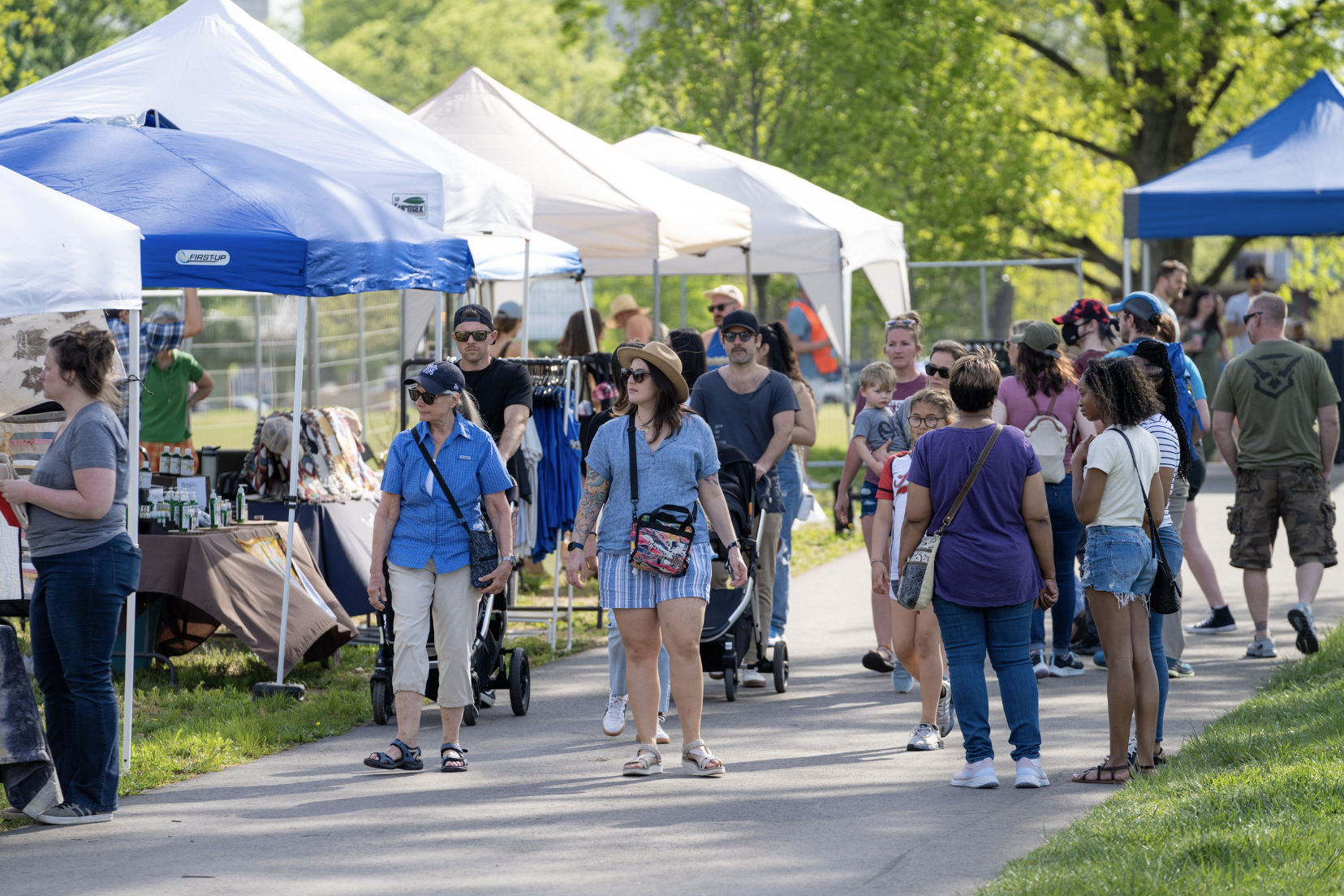Taking Climate Action
By Remi Lynch, Landscape Planning Associate
8 min read - This article summarizes the public responses to the recommendations made by Metro Nashville's Sustainability Advisory Committee Report.
Read an Excerpt from Metro Nashville's Sustainability Advisory Committee ReportThere is overwhelming scientific consensus that human activities are driving climate change, with many studies attributing both incremental change and extreme weather events to anthropogenic climate change. These include extreme heat, natural disasters, sea level rise, species extinction, biodiversity loss, ocean acidification, food insecurity, water shortages and reduced economic growth.
It is estimated that between 2025 and 2035, the Metropolitan Government of Nashville and Davidson County (referred to herein as Nashville, Metro or the City) will face myriad climate risks, including an increased number of intense storms and tornadoes and more frequent flooding and extreme heat days per year. Nashville also will be adversely affected by the economic and social disruptions arising from climate change elsewhere in the United States and around the globe.
In 2017 community emissions totaled roughly 11.4 million metric tons—almost half from transportation and the other half from energy use in commercial, residential and industrial buildings. It is against this challenging backdrop that Nashville has a critical opportunity to address climate change. In 2021, the Mayor’s Sustainability Advisory Committee developed a report outlining a range of recommendations and actions for Nashville to reduce its contributions to climate change and at the same time ensure a healthy, prosperous and resilient future. Climate mitigation actions will not only allow Nashville to contribute to reducing the negative impacts of climate change, but also have a range of other benefits that include fostering economic development and job creation, improved health, economic inclusion, environmental equity and enhanced air quality. Recognizing both the challenges and opportunities, Nashville Mayor John Cooper announced in February 2020 the establishment of a standing Sustainability Advisory Committee, comprising close to 50 community members with a wide range of experience, and charged it with providing advice on a range of sustainability issues. Several months earlier in December 2019, the mayor announced that his administration had rejoined the Global Covenant of Mayors for Climate and Energy. GCoM is a voluntary alliance of more than 10,000 cities and local governments that have made voluntary commitments to reduce their carbon footprints, which could, in aggregate, “account for 2.3 billion tons of CO2e annual emissions reduction, matching yearly passenger road emissions from the U.S., China, France, Mexico, Russia and Argentina combined.” Participating cities are required to develop a citywide climate action plan within three years that includes, but is not limited to, a citywide greenhouse gas emissions target and the emissions reduction actions needed to meet the target. Given the importance and timeline of the climate action plan, the Committee determined that the mitigation component of the plan should be its first area of focus. Although GCoM requires participants to submit progress reports every two years, plan updates may be provided when there are significant changes. In keeping with this dynamic approach, the Committee emphasizes that this report lays out its current recommendations, but its mitigation plan advice may be updated in order to reflect changing circumstances and new information.
Categories for climate action
There are many opportunities that allow a city to become greener and reduce greenhouse gas emissions. As a result the SAC focused on mitigation actions in several specific areas: Climate and Energy, Green Buildings, Mobility, Waste Reduction and Natural Resources.
3500 nashvillians share their priorities
In coordination with the Civic Design Center and with support from a Southeast Sustainability Directors Network Community Collaboration Microgrant, the Mayor’s Office led a climate action survey from April to June 2022, asking Nashvillians about their climate priorities. The survey was a resounding success, with over 3,500 participants.
The Survey Process
The project team and partner organizations distributed a digital survey using digital and physical flyers with QR codes. The project team also attended existing community events including Nashville Earth Day’s Celebration in Centennial Park and a Youth Soccer Tournament in Antioch.
The promotion of the survey also featured a weekly-themed social media blitz for the month of April. See some of the example posts below:
Breaking down the results
The results speak to the idea that people want to see action towards going green, not words. The city needs to lead the way in the change and support those that want to push forward too:
Businesses can be leaders in making contributions to further climate action.
The public is eager for EV charging stations.
Nashvillians are supportive of public transit upgrades.
Recycling of construction waste is a priority for the City’s residents.
How Metro is Addressing climate impacts
In 2021, the Sustainability Advisory Committee released its recommendations for climate action.
This survey sought public support for different policies in the Committee’s report. Nashville has and will continue to take action to address climate change. Below are a few examples of what we’re doing:
In collaboration with the Tennessee Valley Authority, Nashville Electric Services, and Vanderbilt University, Metro is constructing a 125 MW solar array via TVA’s Green Invest Program.
Metro has created a dedicated revenue stream to support tree canopy restoration and maintenance on private properties (Root Nashville) and has strengthened protections for trees on public properties.
Metro recognizes that electrification is a crucial avenue for decarbonization. As such, the City plans to leverage federal funding for EV infrastructure.
Metro is committed to advocating for clean energy. Mayor Cooper has encouraged the TVA to pursue renewable generation sources and Metro is looking at its facilities to determine where solar may be a good fit.
Metro is strongly committed to partnering with the private sector to further sustainability and is exploring opportunities to pursue shared goals. Installation of EV infrastructure, greening of the grid, and pursuing facilities’ energy efficiency are three examples of topics where partnerships may occur.
What Comes NextCitizens in Metro Nashville and Davidson County look to the Metro government to further sustainability through action. They feel that collaboration with businesses to drive change and offer sustainable products at affordable levels is essential. Metro Nashville hears this feedback loud and clear and is committed to prioritizing actions supported by this survey.
Looking to Learn More?
Partners
The project team could not get the participation we did without the distribution support from our partners. Thank you to all the organizations who helped get the word out on the survey.
Thank you:
American Heart Association (Nashville chapter), American Institute of Architects, American Lung Association (Nashville chapter), Ascend Amphitheatre, Beautification Commissioners, Center for Nonprofit Management, Climate Nashville, Climate Reality Project (Nashville chapter), Community Foundation of Middle TN, Compost Company, Compost Nashville, Conexion Americas, Connect Mid-TN, Council Members, Downtown Partnership, Earth and Environmental Science Department, Earth Day, Earth Matters, Fifty Forward, GHG Emissions Inventory Commuter Survey Link, Greater Nashville Regional Council, Greenways for NashvilleHub, Nashville, J.U.M.P., Kurdish Community Center, Metro Parks Community Centers, Metro Nashville Network, Metro Tree Advisory COmmittee, Metro Waste Services, Nashville Department of Transportation, Nashville Environmental Justice Inititiave, Nashville Food Project, Nashville Foodscapes, Nashville Parks Foundation, Nashville Promise Zone, Nashville Public Library, Neighbor 2 Neighbor, NextDoor, NOAH (Nashville Organized for Action and Hope), Office of Neighborhoods, Parks Department, Planning Department, Root Nashville / Cumberland River Compact, Second Presbyterian Church, Stand Up Nashville, Sustainability Advisory Committee, Tennessee Conservation Voters, Tennessee Environmental Council, Tennessee Immigrant and Refugee RIghts Coalition, Tennessee Interfaith Power & Light, Tennessee Women in Green, TennGreen, The Healing Trust, Urban League of Middle Tennessee, Vanderbilt Community Garden group, Vanderbilt SPEAR, Vanderbilt Women in Government.
Other innovative outreach strategies included Celebrity, Melissa Joan Hart who is a resident of Nashville, promoting the survey multiple times via Instagram.













